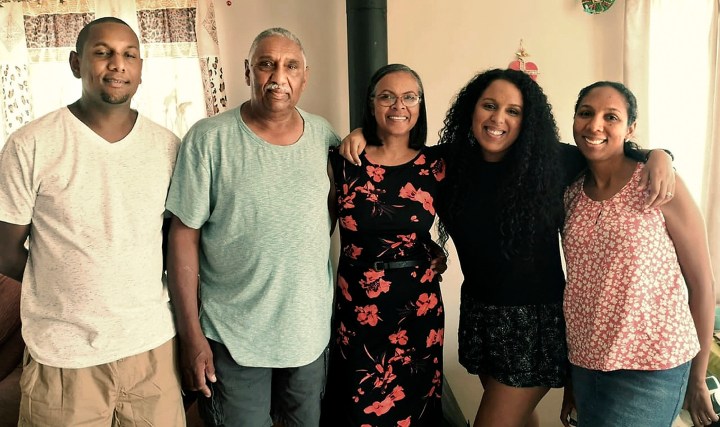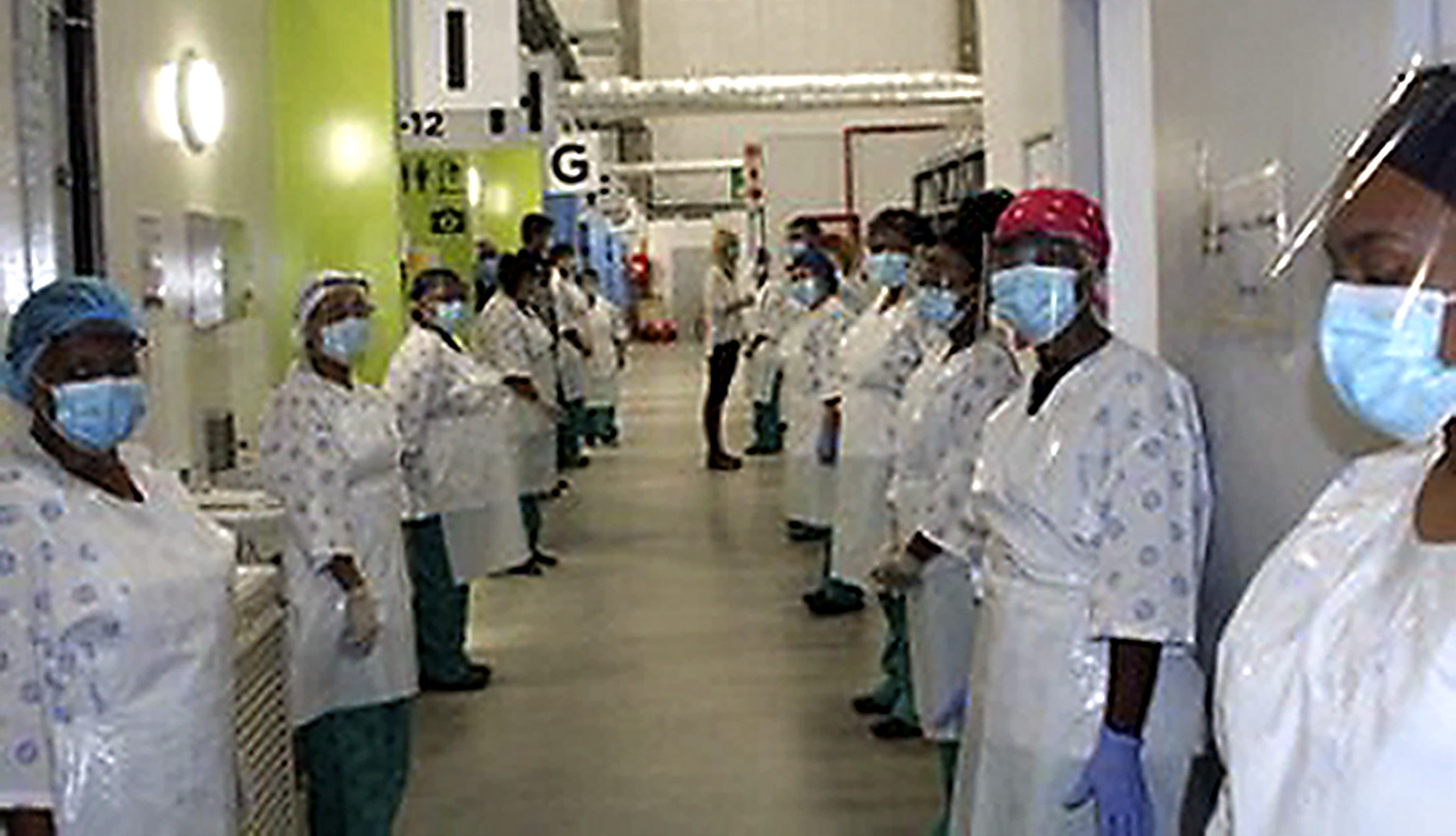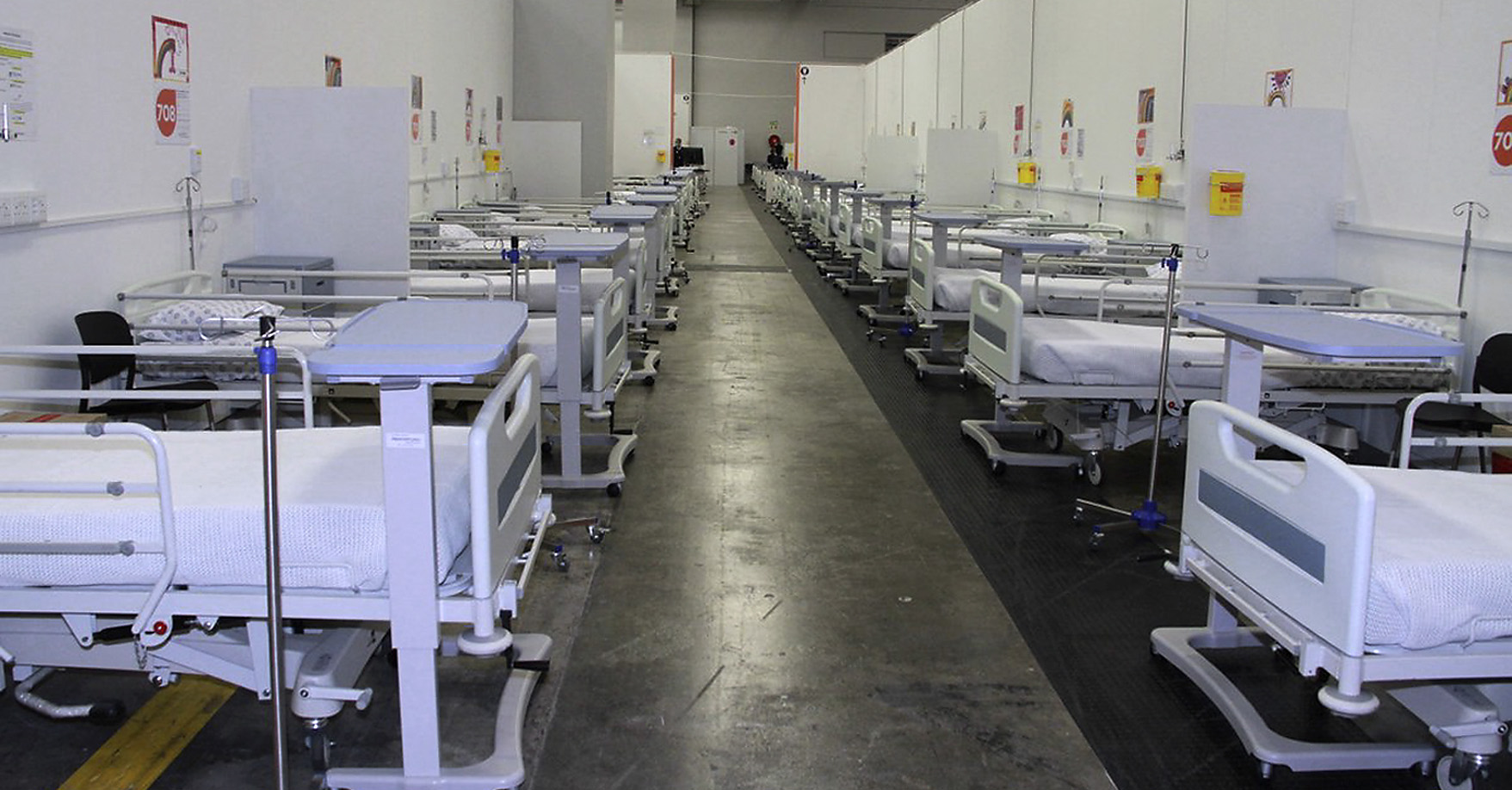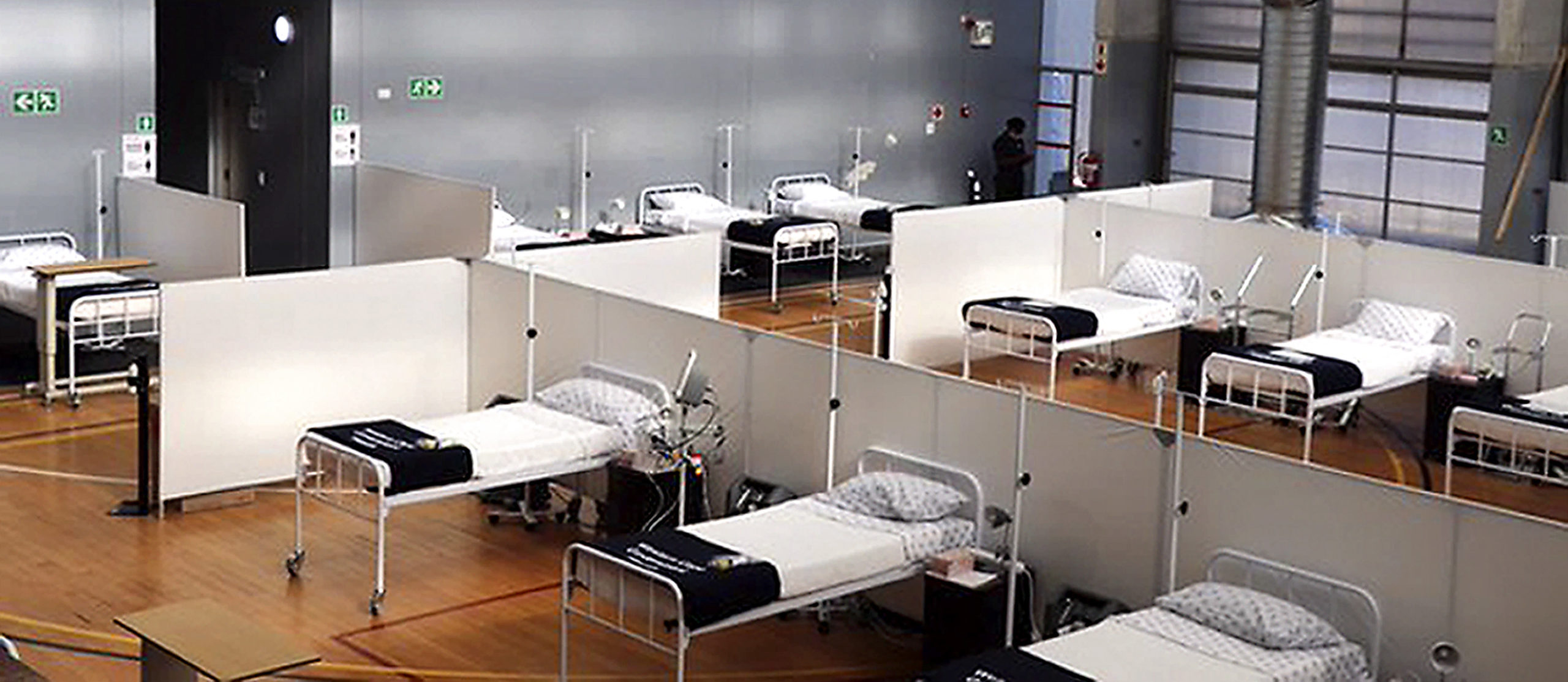SPOTLIGHT
‘I owe my life to the Hospital of Hope’: A survivor’s story

On 22 July Richard Abrahams, his wife and three children celebrated his 65th birthday with orange cake and well-wishes. Less than a month before, Abrahams was battling to breathe due to Covid-19, on oxygen at a Cape Town field hospital. He shares his story.
Richard Abrahams, a professional driver at a Cape Town engineering firm, nearly did not live to see his 65th birthday.
Abrahams credits top healthcare at Tygerberg Hospital and the Hospital of Hope – the Western Cape field hospital at the Cape Town International Convention Centre – for saving his life.
On June 24, Abrahams could not breathe when he was put on oxygen at Tygerberg Hospital, after testing positive for Covid-19 the previous day. He was transferred to the convention centre two days later, all the while having oxygen administered inside the ambulance via a face mask.

Staff at Brackengate, a field hospital in the Western Cape. (Photo: WC Health)
“Okay. I’m going to start at the start,” Abrahams tells Spotlight, speaking from his garden on a FaceTime interview.
“On Thursday, 18 June, I was driving the company truck when all of a sudden, out of the blue, my body started aching. I just felt so tired. When I got out of the truck, I said to my supervisor, ‘Look, there are a couple of lunchtimes due to me, may I take them to have a rest, please?’ After sleeping that afternoon, I felt a little bit better.
“But then the next day, the Friday, I felt bad. I actually phoned in to work and said, ‘I’m not coming in.’ And then by the Sunday I really felt bad.

The Hospital of Hope at the Cape Town International Convention Centre. (Photo: WC Health)
“That’s when my daughter took me to Tygerberg Hospital to be tested. On Tuesday, they called us with the results. We were all positive for Covid: me, my wife and daughter. My wife and my daughter’s symptoms were mild though, some headaches, nothing major.
“The next day, I really, really felt terrible. You know, I started to have breathing problems, headaches, I didn’t walk well, all those things. And then my daughter decided to take me to Tygerberg again on the 24th. I was coughing, and I was breathing heavily, my chest was paining. You know, even walking from the car to the little centre there, the Covid-19 testing centre, I almost thought I wasn’t gonna make it. While I was sitting, waiting for the bed, they put me on oxygen already. A mask with oxygen, so I could breathe it in. And thank God, a bed was made available for me in a ward, so I could be admitted.”
At this time, even visiting the bathroom was an ordeal.

Inside the Hospital of Hope. (Photo: WC Health)
“Going to the bathroom, which was just around the corner, it was an effort. Oh, it was terrible,” says Abrahams. “I had to take off the oxygen mask, because it wasn’t portable. So I’d go to the bathroom and then I would come back and feel tired and put it back on.”
On 26 June 2020, Abrahams was transferred to the Hospital of Hope at the convention centre.
“Inside the ambulance, I had oxygen too,” recalls Abrahams. “The ambulance dropped me off at the entrance to the convention centre’s wards. They brought over a wheelchair and took me inside. There was a bed ready for me and immediately I was put on the oxygen, again. I was struggling to breathe and I couldn’t really talk because the minute I started talking I’d start to cough and then my chest would tighten up again.”

Another field hospital, at the Thusong Centre in Khayelitsha. (Photo: WC Health)
He would spend five more nights at the field hospital, in bed 645 in Ward W.
The Hospital of Hope has 862 beds, and was officially opened by Western Cape Premier Alan Winde on 5 June.
Inside the temporary facility, patients are seldom alone. There are doctors, nurses, porters, food trolleys, and tea and coffee bearers. Beds are equipped with phone chargers and alarm buttons. The main lights are dimmed at 11pm, but faint lights remain on throughout the night as security staff patrol the premises. When a patient gets lost ambling to the bathroom, they repeat their bed number to a member of staff, who will lead them back to their bed.
At the foot of every second bed, adult nappies are placed in closed plastic boxes for patients unable to access the portable toilets. Each morning, every patient’s bedding is checked and changed if required, and clean pyjamas and a towel are provided.
“For patients who couldn’t go to the bathroom, they had throwaway nappies,” says Abrahams. “Fortunately, I didn’t need that. I never smelled them, porters emptied the boxes regularly. As far as going to the bathroom, I couldn’t walk 10 paces, then I had to lie down again. So the porters had to take me to the bathroom on a wheelchair.
“You know, it’s portable toilets, really clean, very neat, but there are three steps you have to go up to get into the thing. And I battled with those three steps. And even to use the toilet, that was such an effort, you know?
“And then, the day after that, I wanted to go shower. That was the biggest mistake because I got into the shower and the hot water, it was overwhelming. The water that fell on my body felt like big drops of lead. It was terrible. And then I just gave up. They had to take me back to bed. There wasn’t an alarm button in the shower, but the porter was waiting for me outside. The porters were obviously also dressed in special overalls [personal protective equipment] from head to toe, everyone was.”
Was he ever scared?
“Look, I could see that there were, you know, very sick people. On a bed opposite of me, there was one guy who was pretty sick. I could hear him coughing all night. And there was another old man. He was just sleeping and lying and coughing and stuff. The next morning when I woke up, these people would be gone. I don’t know what happened, but 10 minutes later some other patient would be pushed in there. I never asked what happened.
“It’s kind of frightening, but then I’m a Christian, I have peace of mind.”
During a media briefing last week, Winde said that on 28 July, the Hospital of Hope had admitted a cumulative total of 1,366 patients. At present, 139 patients are being treated there. To date, the facility has discharged 1,150 patients and there have been 77 deaths.
More than 50 doctors and 320 nurses service the temporary hospital, including Cuban doctors, agency staff, additional bursary nurses and volunteers.
Abrahams was bursting with praise for healthcare workers at the facility.
“I was pretty sick when I first arrived there,” he says. “But what I noticed was that if there was a particularly bad patient, all the doctors would mill around that bed, discussing what’s the next step. Even myself, you know, my doctor who attended to me, she was a Dr Marsha Hermanus.
“Shoh, what a person to have as your doctor. You know, when I talked to her, she would be so patient. I ask questions, you know, I’m one of those people who asks questions and she would talk to me and she would reassure me – your medication is going well, your treatment is going well, that sort of thing. Keeping me calm and comfortable.”
Abrahams stresses that his message is that people should not be scared to use the Western Cape’s Covid-19 facilities.
Abrahams says at night staff would patrol the wards. “If you were awake, you could see them walking past, maybe two people, just checking, and when they’re satisfied they’d go back to wherever they sit. If you felt terrible, you could ring a bell.
“From the porters to the nurses, to the people that bring your food, all of them – their service was humbling. It was so friendly and hearty. I could taste and smell, but didn’t have much of an appetite. I had a little bit of porridge and some of my food at lunchtime,” he says.
“But my appetite came back eventually, later in the week. The food was very healthy, very good. Mieliepap for breakfast. You know, mince with vegetables maybe, and sometimes it would be chicken stew with vegetables. A lot of vegetables, always healthy and tasty. And it came sealed, plastic around it and everything. Very hygiene conscious. There was always tea or coffee, with fruit served in between meals – bananas, apples and pears.”
Abrahams adds that despite the convention centre’s airy halls, he was never cold. On his bed, he had a sheet, a blanket and a duvet.
As he got better, he used the convention centre’s free wi-fi to watch movies, all the while keeping in touch with his wife, Elizabeth, back home over WhatsApp.
“I think it was the 29th when the doctor came to me, and she said that I was responding so well to the medication and all the readings sounded perfect, so they were going to take me off the oxygen and see what happens. So my first oxygen intake reading was 89 [millimetres of mercury]. They wanted it to be 94. Then it came up, until it was 93, then 94, then 95. And then it stayed there, it didn’t go down again. So the physio came to do her thing. She took me for a walk and wonder above wonder, I wasn’t that tired,” says Abrahams.
“And then later in the day, I went to the toilet by myself, and the next morning, I could go and shower and not feel sick. So that was amazing. It was amazing to me. And then the doctor said that I was well enough to go home the next day on 1 July. So I waited for my son-in-law. He came and fetched me around lunchtime.”
Abrahams stresses that his message is that people should not be scared to use the Western Cape’s Covid-19 facilities.
“I want to say if you have this illness, don’t be scared to go to these field hospitals. I believe that if I didn’t go, I would not have made it. I wouldn’t have been alive. The treatment was so excellent. I have no complaints. I will tell anybody.” DM/MC
Look here for the number and progress of field hospitals across provinces.
This article was produced by Spotlight – health journalism in the public interest. Sign up for our newsletter.
"Information pertaining to Covid-19, vaccines, how to control the spread of the virus and potential treatments is ever-changing. Under the South African Disaster Management Act Regulation 11(5)(c) it is prohibited to publish information through any medium with the intention to deceive people on government measures to address COVID-19. We are therefore disabling the comment section on this article in order to protect both the commenting member and ourselves from potential liability. Should you have additional information that you think we should know, please email [email protected]"




 Become an Insider
Become an Insider